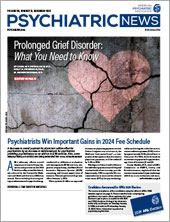According to the National Center for PTSD, some
5% of U.S. adults experience posttraumatic stress disorder (PTSD) each year. While trauma-based psychotherapies—such as exposure therapy—are the gold standard for treatment of PTSD, these therapies can be time intensive and are known to have high dropout rates.
Multiple studies suggest that integrating psychedelic 3,4-methylenedioxymethamphetamine (MDMA) into therapy sessions may lead to greater improvements in patients with PTSD. A
report published this month in
Nature Medicine now suggests that several sessions of MDMA-assisted therapy may lead to improvements in a diverse population of adults with moderate to severe PTSD.
“In a historic first, to our knowledge, for psychedelic treatment studies, participants who identified as ethnically or racially diverse encompassed approximately half of the study sample,” wrote Jennifer Mitchell, Ph.D., of the University of California, San Fransico, and colleagues. “A substantial proportion of participants displayed comorbid features associated with high treatment resistance, such as major depression, multiple sources of trauma (including childhood and combat trauma), and dissociative subtype PTSD.”
Mitchell and colleagues enrolled 104 adults 18 years and older with moderate to severe PTSD—defined as a score of at least 28 on the Clinician-Administered PTSD Scale for DSM-5 (CAPS-5). The participants, recruited from 13 sites across the United States and Israel, included 28 individuals who identified as Hispanic/Latino and 35 individuals who identified as American Indian/Alaska Native, Asian, Black/African American, Native Hawaiian/Pacific Islander, or multiple races.
Before starting therapy, all participants received three, 90-minute therapy sessions to prepare them for the study. The participants were then randomized to receive MDMA combined with therapy or placebo combined with therapy. They completed three eight-hour dosing sessions conducted by a two-person therapy team, spaced about one month apart. During these therapy sessions, 53 participants took the assigned MDMA pill and 51 took a placebo pill. Each of these sessions was followed by three 90-minute integration sessions to help the participants “in processing and understanding their experience,” Mitchell and colleagues wrote.
At baseline, the average CAPS-5 score among the participants was 39. At 18 weeks (about six to eight weeks after the third dosing session), CAPS-5 scores fell by 23.7 points in the MDMA group compared with 14.8 points in the placebo group. Further, 71.2% of those in the MDMA group no longer met DSM-5 criteria for PTSD after 18 weeks, compared with 47.6% of those in the placebo group. The participants in the MDMA group also showed reductions in functional impairment, as measured by changes from baseline on the Sheehan Disability Scale.
“MDMA simultaneously induces prosocial feelings and softens responses to emotionally challenging and fearful stimuli, potentially enhancing the ability of individuals with PTSD to benefit from psychotherapy by reducing sensations of fear, threat and negative emotionality,” the authors wrote. “The low dropout rate for MDMA-[assisted therapy] has been replicated across seven studies, suggesting that MDMA induces a true shift in participant engagement.”
The study was funded by Multidisciplinary Association for Psychedelic Studies (MAPS), with support from the Steven and Alexandra Cohen Foundation. ■

